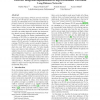Free Online Productivity Tools
i2Speak
i2Symbol
i2OCR
iTex2Img
iWeb2Print
iWeb2Shot
i2Type
iPdf2Split
iPdf2Merge
i2Bopomofo
i2Arabic
i2Style
i2Image
i2PDF
iLatex2Rtf
Sci2ools
NSDI
2007
2007
WiLDNet: Design and Implementation of High Performance WiFi Based Long Distance Networks
WiFi-based Long Distance (WiLD) networks with links as long as 50–100 km have the potential to provide connectivity at substantially lower costs than traditional approaches. However, real-world deployments of such networks yield very poor end-to-end performance. First, the current 802.11 MAC protocol has fundamental shortcomings when used over long distances. Second, WiLD networks can exhibit high and variable loss characteristics, thereby severely limiting end-to-end throughput. This paper describes the design, implementation and evaluation of WiLDNet, a system that overcomes these two problems and provides enhanced end-to-end performance in WiLD networks. To address the protocol shortcomings, WiLDNet makes several essential changes to the 802.11 MAC protocol, but continues to exploit standard (low-cost) WiFi network cards. To better handle losses and improve link utilization, WiLDNet uses an adaptive loss-recovery mechanism using FEC and bulk acknowledgments. Based on a real-world...
| Added | 02 Oct 2010 |
| Updated | 02 Oct 2010 |
| Type | Conference |
| Year | 2007 |
| Where | NSDI |
| Authors | Rabin K. Patra, Sergiu Nedevschi, Sonesh Surana, Anmol Sheth, Lakshminarayanan Subramanian, Eric A. Brewer |
Comments (0)

